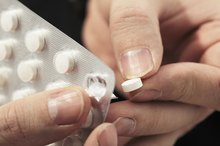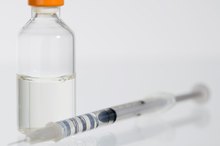The Dangers of Taking Insulin When You Don't Need It
Insulin is a crucial hormone which, among other functions, helps the body control blood sugar levels. Many people with diabetes need insulin injections to regulate their blood sugar, according to the Centers for Disease Control and Prevention (CDC) 14.
Unfortunately, there are some misconceptions about insulin — and some people even take it for purposes other than managing diabetes 1. This can have serious health consequences.
How Does Insulin Work?
The body converts carbohydrates in food into glucose. Insulin helps move glucose from the bloodstream into the cells, which use it for energy, according to Kaiser Permanente 2. This decreases the amount of glucose in the blood, lowering blood sugar levels. But if the body doesn't have enough insulin or can't use it correctly — as is the case for people with diabetes — high blood sugar may result 1.
Insulin injections help many people with diabetes to lower their blood sugar 1. But finding the right amount of insulin can be a delicate balance: Taking too much can remove too much glucose from the blood, resulting in low blood sugar (hypoglycemia) 156.
Insulin performs other functions aside from managing blood sugar. It also plays a role in muscle growth and endurance, which is why some people without diabetes who want to enhance these benefits take insulin 1.
But using insulin when your body already has enough can be dangerous. According to Osama Hamdy, MD, director of the inpatient diabetes program at Harvard's Joslin Diabetes Center, if a person without diabetes takes insulin, it may cause hypoglycemia 1. And if the insulin dose is large, it can be fatal if it's not treated in time.
Read more: What You Need to Know About the Effects of Stevia on Insulin
- The body converts carbohydrates in food into glucose.
- Insulin injections help many people with diabetes to lower their blood sugar 1.
Bodybuilding and Insulin Abuse
The Dangers of Abusing Insulin for Bodybuilding
Learn More
Insulin is an anabolic hormone, which means it promotes protein synthesis and muscle growth. According to a September 2016 review published in the Journal of Basic Clinical Physiology and Pharmacology, bodybuilders have been known to use insulin to try to "bulk up." But the review's authors stressed that this is not a good idea 3. "Athletes are risking long-term harm by using these drugs ... potentially resulting in coma and death," they wrote.
It should also be noted that exercise lowers blood sugar levels, according to the American Diabetes Association, which increases the risk of bodybuilding-related insulin overdose 14. According to the review, insulin abuse among athletes is a growing problem. The Olympic Committee Medical Commission has banned non-diabetes insulin use since 1998 1.
Read more: The Dangers of Abusing Insulin for Bodybuilding
- Insulin is an anabolic hormone, which means it promotes protein synthesis and muscle growth.
- Athletes are risking long-term harm by using these drugs... potentially resulting in coma and death," they wrote.
Insulin Overdose Symptoms
You're probably familiar with two of the symptoms of hypoglycemia, namely, hunger and irritability. Those symptoms can occur even if you don't take insulin, because they're simply your body's way of saying it needs more fuel. But for someone on insulin, there are other symptoms to be aware of. According to the Cleveland Clinic, insulin overdose symptoms can include hunger, irritability and one or more of the following 456:
- Dizziness
- Anxiety
- Shakiness
- Sweating
- Headaches
- Pale skin
- Fast heartbeat
- Blurred or impaired vision
- Tingling or numbness in the lips, tongue or cheeks
- Difficulty concentrating or thinking
- Seizures
- Fainting
Warnings
The symptoms of insulin overdose can arise very quickly, so it's important to treat low blood sugar right away. If left untreated, hypoglycemia can be fatal.
- You're probably familiar with two of the symptoms of hypoglycemia, namely, hunger and irritability.
- But for someone on insulin, there are other symptoms to be aware of.
How To Treat Low Blood Sugar
What Are Glucose Tablets Used For?
Learn More
If you experience the symptoms of hypoglycemia, it's important to raise your blood sugar right away 5. Eat a small snack that contains about 15 grams of fast-acting carbohydrates — simple carbs that are quickly absorbed and will therefore raise your blood sugar fast 4. According to the University of California, San Francisco, good options include:
- 4 ounces (1/2 cup) of fruit juice
- 8 ounces (1 cup) of nonfat milk
- 1/2 of a banana
- 1 small apple or orange
- 1 tablespoon of sugar, honey, jam or jelly
- A few hard candies, gummies or chews
It typically takes about 15 minutes for the body to process carbs into glucose. If your symptoms don't improve after 15 minutes, have another snack. But if your symptoms get worse, seek immediate medical attention.
If someone you know has taken insulin and they exhibit severe signs of hypoglycemia — including seizures or loss of consciousness — call an ambulance right away.
Read more: Do Oranges Raise Your Blood Sugar?
- If you experience the symptoms of hypoglycemia, it's important to raise your blood sugar right away 5, good options include: * 4 ounces (1/2 cup) of fruit juice * 8 ounces (1 cup) of nonfat milk * 1/2 of a banana * 1 small apple or orange * 1 tablespoon of sugar, honey, jam or jelly * A few hard candies, gummies or chews It typically takes about 15 minutes for the body to process carbs into glucose.
The Bottom Line
Never take insulin if it has not been prescribed to you by a doctor. Taking insulin when your body already has enough can be dangerous and possibly life-threatening.
Related Articles
References
- CDC: "About Diabetes"
- Kaiser Permanente: "How Insulin Works"
- Journal of Basic Clinical Physiology and Pharmacology: "Non-Diabetic Clinical Applications of Insulin"
- ADA: "Blood Sugar and Exercise"
- Cleveland Clinic: "Hypoglycemia (Low Blood Sugar)"
- UCSF: "Treating Low Blood Sugar"
- National Institute of Diabetes and Digestive and Kidney Diseases. Insulin, medicines, & other diabetes treatments. Updated December 2016.
- Heise T, Nosek L, Roepstorff C, et al. Distinct prandial and basal glucose-lowering effects of insulin degludec/insulin aspart (idegasp) at steady state in subjects with type 1 diabetes mellitus. Diabetes Ther. 2014;5(1):255-265. doi:10.1007/s13300-014-0070-2
- American Diabetes Association. Insulin basics.
Resources









